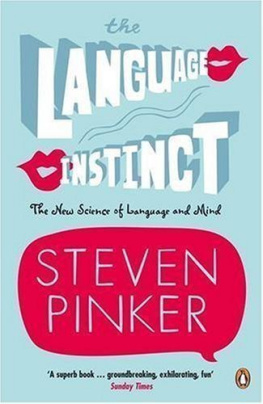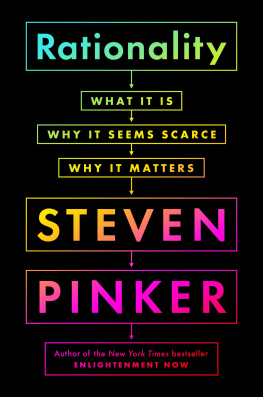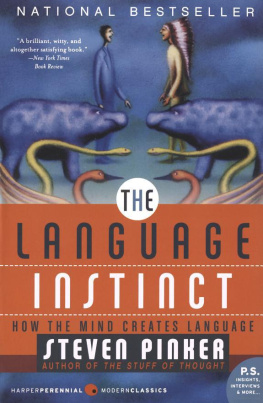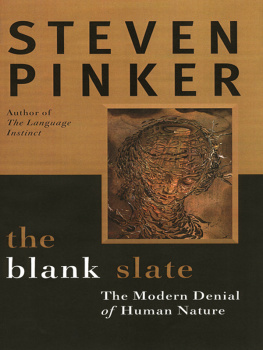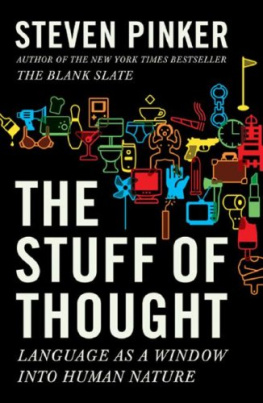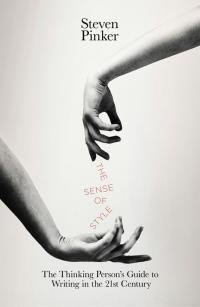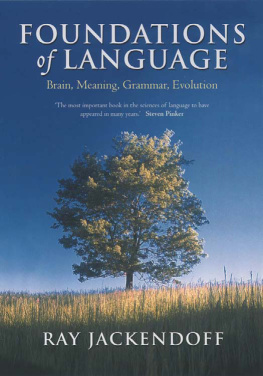Steven Pinker - The Language Instinct: The New Science of Language and Mind
Here you can read online Steven Pinker - The Language Instinct: The New Science of Language and Mind full text of the book (entire story) in english for free. Download pdf and epub, get meaning, cover and reviews about this ebook. year: 1994, genre: Science. Description of the work, (preface) as well as reviews are available. Best literature library LitArk.com created for fans of good reading and offers a wide selection of genres:
Romance novel
Science fiction
Adventure
Detective
Science
History
Home and family
Prose
Art
Politics
Computer
Non-fiction
Religion
Business
Children
Humor
Choose a favorite category and find really read worthwhile books. Enjoy immersion in the world of imagination, feel the emotions of the characters or learn something new for yourself, make an fascinating discovery.
- Book:The Language Instinct: The New Science of Language and Mind
- Author:
- Genre:
- Year:1994
- Rating:3 / 5
- Favourites:Add to favourites
- Your mark:
- 60
- 1
- 2
- 3
- 4
- 5
The Language Instinct: The New Science of Language and Mind: summary, description and annotation
We offer to read an annotation, description, summary or preface (depends on what the author of the book "The Language Instinct: The New Science of Language and Mind" wrote himself). If you haven't found the necessary information about the book — write in the comments, we will try to find it.
The Language Instinct: The New Science of Language and Mind — read online for free the complete book (whole text) full work
Below is the text of the book, divided by pages. System saving the place of the last page read, allows you to conveniently read the book "The Language Instinct: The New Science of Language and Mind" online for free, without having to search again every time where you left off. Put a bookmark, and you can go to the page where you finished reading at any time.
Font size:
Interval:
Bookmark:
STEVEN PINKER
THE LANGUAGE INSTINCT
The New Science of Language and Mind

PENGUIN BOOKS
[1994]
for
Harry and Roslyn Pinker
who gave me language
I have never met a person who is not interested in language. I wrote this book to try to satisfy that curiosity. Language is beginning to submit to that uniquely satisfying kind of understanding that we call science, but the news has been kept a secret.
For the language lover, I hope to show that there is a world of elegance and richness in quotidian speech that far outshines the local curiosities of etymologies, unusual words, and fine points of usage. For the reader of popular science, I hope to explain what is behind the recent discoveries (or, in many cases, nondiscoveries) reported in the press: universal deep structures, brainy babies, grammar genes, artificially intelligent computers, neural networks, signing chimps, talking Neanderthals, idiot savants, feral children, paradoxical brain damage, identical twins separated at birth, color pictures of the thinking brain, and the search for the mother of all languages. I also hope to answer many natural questions about languages, like why there are so many of them, why they are so hard for adults to learn, and why no one seems to know the plural of Walkman.
For students unaware of the science of language and mind, or worse, burdened with memorizing word frequency effects on lexical decision reaction time or the fine points of the Empty Category Principle, I hope to convey the grand intellectual excitement that launched the modern study of language several decades ago.
For my professional colleagues, scattered across so many disciplines and studying so many seemingly unrelated topics, I hope to offer a semblance of an integration of this vast territory. Although I am an opinionated, obsessional researcher who dislikes insipid compromises that fuzz up the issues, many academic controversies remind me of the blind men palpating the elephant. If my personal synthesis seems to embrace both sides of debates like formalism versus functionalism or syntax versus semantics versus pragmatics, perhaps it is because there was never an issue there to begin with.
For the general nonfiction reader, interested in language and human beings in the broadest sense, I hope to offer something different from the airy platitudesLanguage Litethat typify discussions of language (generally by people who have never studied it) in the humanities and sciences alike. For better or worse, I can write in only one way, with a passion for powerful, explanatory ideas, and a torrent of relevant detail. Given this last habit, I am lucky to be explaining a subject whose principles underlie wordplay, poetry, rhetoric, wit, and good writing. I have not hesitated to show off my favorite examples of language in action from pop culture, ordinary children and adults, the more flamboyant academic writers in my field, and some of the finest stylists in English.
This book, then, is intended for everyone who uses language, and that means everyone!
I owe thanks to many people. First, to Leda Cosmides, Nancy Etcoff, Michael Gazzaniga, Laura Ann Petitto, Harry Pinker, Robert Pinker, Roslyn Pinker, Susan Pinker, John Tooby, and especially Ilavenil Subbiah, for commenting on the manuscript and generously offering advice and encouragement.
My home institution, the Massachusetts Institute of Technology, is a special environment for the study of language, and I am grateful to the colleagues, students, and former students who shared their expertise. Noam Chomsky made penetrating criticisms and helpful suggestions, and Ned Block, Paul Bloom, Susan Carey, Ted Gibson, Morris Halle, and Michael Jordan helped me think through the issues in several chapters. Thanks go also to Hilary Bromberg, Jacob Feldman, John Houde, Samuel Jay Keyser, John J. Kim, Gary Marcus, Neal Perlmutter, David Pesetsky, David Poppel, Annie Senghas, Karin Stromswold, Michael Tarr, Marianne Teuber, Michael Ullman, Kenneth Wexler, and Karen Wynn for erudite answers to questions ranging from sign language to obscure ball players and guitarists. The Department of Brain and Cognitive Sciences librarian, Pat Claffey, and computer system manager, Stephen G. Wadlow, those most admirable prototypes of their professions, offered dedicated, expert help at many stages.
Several chapters benefited from the scrutiny of real mavens, and I am grateful for their technical and stylistic comments: Derek Bickerton, David Caplan, Richard Dawkins, Nina Dronkers, Jane Grimshaw, Misia Landau, Beth Levin, Alan Prince, and Sarah G. Thomason. I also thank my colleagues in cyberspace who indulged my impatience by replying, sometimes in minutes, to my electronic queries: Mark Aronoff, Kathleen Baynes, Ursula Bellugi, Dorothy Bishop, Helena Cronin, Lila Gleitman, Myrna Gopnik, Jacques Guy, Henry Kucera, Sigrid Lipka, Jacques Mehler, Elissa Newport, Alex Rudnicky, Jenny Singleton, Virginia Valian, and Heather Van der Lely. A final thank you to Alta Levenson of Bialik High School for her help with the Latin.
I am happy to acknowledge the special care lavished by John Brockman, my agent, Ravi Mirchandani, my editor at Penguin Books, and Maria Guarnaschelli, my editor at William Morrow; Marias wise and detailed advice vastly improved the final manuscript. Katarina Rice copy-edited my first two books, and I am delighted that she agreed to my request to work with me on this one, especially considering some of the things I say in Chapter 12.
My own research on language has been supported by the National Institutes of Health (grant HD 18381) and the National Science Foundation (grant BNS 9109766), and by the McDonnell-Pew Center for Cognitive Neuroscience at MIT .
Contents
An Instinct
to Acquire an Art
As you are reading these words, you are taking part in one of the wonders of the natural world. For you and I belong to a species with a remarkable ability: we can shape events in each others brains with exquisite precision. I am not referring to telepathy or mind control or the other obsessions of fringe science; even in the depictions of believers these are blunt instruments compared to an ability that is uncontroversially present in every one of us. That ability is language. Simply by making noises with our mouths, we can reliably cause precise new combinations of ideas to arise in each others minds. The ability comes so naturally that we are apt to forget what a miracle it is. So let me remind you with some simple demonstrations. Asking you only to surrender your imagination to my words for a few moments, I can cause you to think some very specific thoughts:
When a male octopus spots a female, his normally grayish body suddenly becomes striped. He swims above the female and begins caressing her with seven of his arms. If she allows this, he will quickly reach toward her and slip his eighth arm into her breathing tube. A series of sperm packets moves slowly through a groove in his arm, finally to slip into the mantle cavity of the female.
Cherries jubilee on a white suit? Wine on an altar cloth? Apply club soda immediately. It works beautifully to remove the stains from fabrics.
When Dixie opens the door to Tad, she is stunned, because she thought he was dead. She slams it in his face and then tries to escape. However, when Tad says, I love you, she lets him in. Tad comforts her, and they become passionate. When Brian interrupts, Dixie tells a stunned Tad that she and Brian were married earlier that day. With much difficulty, Dixie informs Brian that things are nowhere near finished between her and Tad. Then she spills the news that Jamie is Tads son. My what? says a shocked Tad.
Next pageFont size:
Interval:
Bookmark:
Similar books «The Language Instinct: The New Science of Language and Mind»
Look at similar books to The Language Instinct: The New Science of Language and Mind. We have selected literature similar in name and meaning in the hope of providing readers with more options to find new, interesting, not yet read works.
Discussion, reviews of the book The Language Instinct: The New Science of Language and Mind and just readers' own opinions. Leave your comments, write what you think about the work, its meaning or the main characters. Specify what exactly you liked and what you didn't like, and why you think so.

